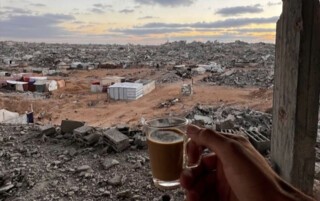Seventeen Minutes of Rain
Hassan Ayman Herzallah
In the first week of November I was sitting with my mother in the tent in al-Mawasi in southern Gaza. It was 9 a.m. on one of the most beautiful mornings I had experienced in a long time. I was used to waking up early to light the fire and prepare a cup of tea for myself and my family, a simple task that could take up most of the morning. But now we had received cooking gas, after more than eight months without, and I made a hot cup of tea with a piece of bread for myself, my father and my mother.
‘We can’t stay here through the winter,’ my mother said. ‘Our tents are worn out.’ I had no answer for her. Even if we had been allowed to cross the Yellow Line to get to Rafah, our home there had been destroyed months ago. I went down to the sea to meet my friends Abboud and Yusuf and asked them about the possibility of finding an apartment for the winter. Yusuf was thinking along similar lines. He was living in a university building, but with the war officially ‘over’ the university had announced that the building would have to be vacated to prepare for the resumption of classes.
The next day Yusuf and I headed to Khan Younis to look for somewhere to live. More than half of Gaza’s buildings have been reduced to rubble and a further third have been damaged. Our search was exhausting. After a week of looking, the lowest rent we found for an apartment was over $500, without any services. Access to water, the internet or charging points for phones was extremely limited. Every day I returned to the tents where my family were waiting for me to bring good news, but there was none.
Towards the end of November, Yusuf called to say he had found an apartment at a reasonable price in a devastated area of Khan Younis that was too small for his family of ten but might be suitable for the six of us.
The next day, Yusuf and I went to see the apartment. I recognised the street it was on from before the war. No one was around. I could hear the echo of my footsteps. Memories of the street before it was destroyed flooded back: how the neighbourhood used to be, the people, children playing football, the streets lit up … Yusuf interrupted my reverie: ‘Here’s the apartment.’
It was abandoned. The door was made of tattered fabric. We stepped through it into the hallway, which was partially destroyed. There was a large room with a crumbling ceiling, a small bathroom and a simple kitchen. Yusuf was keen for me to take the apartment but I couldn’t: I couldn’t live there with all my memories of what the neighbourhood had been like before. I returned to the tents to tell my father.
That night there was a change in the weather. Rain seemed likely. Cold seeped through the tents. My father went outside to prepare them as best he could against a possible storm.
At 11 o’clock there was no light in the camp. I was about to fall asleep when I heard raindrops hitting the tent roof. I hoped I was imagining it, until my little brother Muhammad called out: ‘Hassan, water is coming in here!’ I jumped up. Rain was pouring into the tent. I tried to block the gap but the entire tent was worn and fragile. The rain grew heavier. I could hear other people in the camp struggling to protect their tents from the rain and wind.
My father came out of his tent and called for me. Water had started coming into his tent from below. My little sister Malak and I hurried to salvage the important belongings before they got soaked. I could hear our neighbour Abu Adam shouting in despair as the rain tore through his tent and flooded it. My friend Wasim was carrying his brother, who cannot walk, out of their flooded tent.
After seventeen minutes the sky cleared. Seventeen minutes of rain was enough to flood the tents of thousands of families. Months of winter lie ahead.
